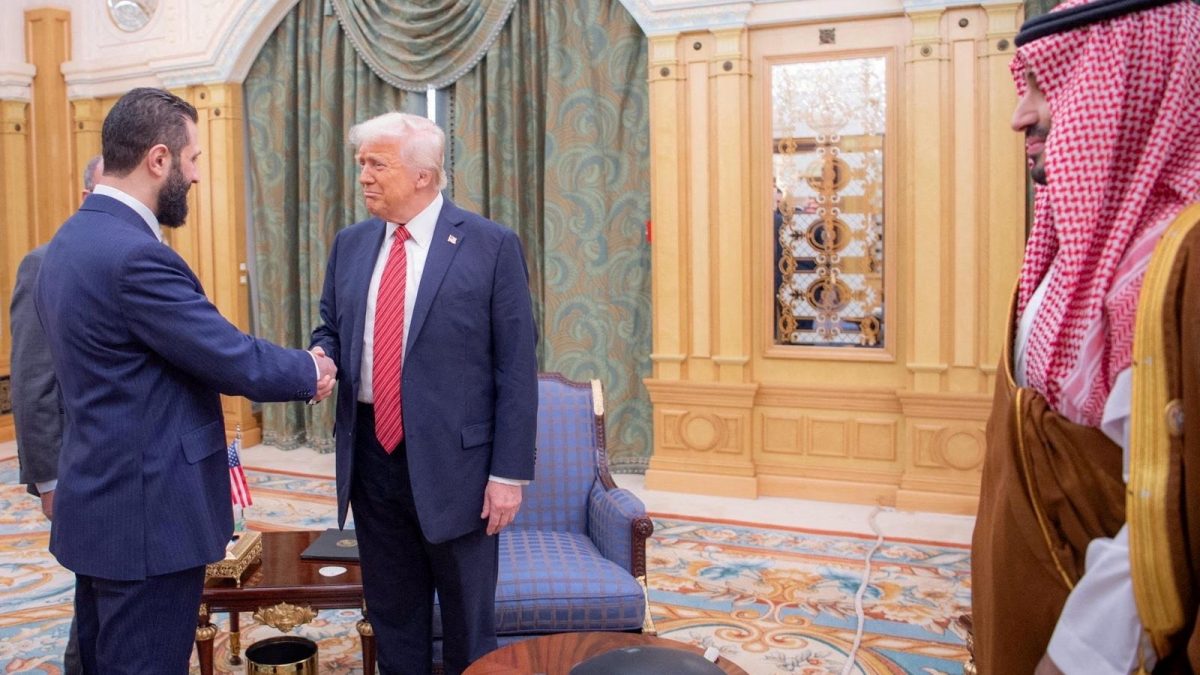Syria welcomed the Trump administration’s decision to ease US sanctions on Saturday, as Washington seeks to begin a new chapter in its ties with Syria.
During a Gulf visit earlier this month, US President Donald Trump surprised many by announcing the new policy while shaking hands with Ahmed al-Sharaa, the jihadist who is now Syria’s interim president.
Trump said he wanted to give the war-torn country’s new rulers “a chance at greatness” after their overthrow of longtime ruler Bashar al-Assad in December.
“The Syrian Arab Republic welcomes the decision from the American government to lift the sanctions imposed on Syria and its people for long years,” a foreign ministry statement said.
It described the move as “a positive step in the right direction to reduce humanitarian and economic struggles in the country”.
The Treasury Department issued a general license known as GL25, “authorizes transactions prohibited by the Syrian Sanctions Regulations, effectively lifting sanctions on Syria,” the Treasury said in a statement.
“GL25 will enable new investment and private sector activity consistent with the President’s America First strategy,” the statement said.
Most of the US sanctions on Syria were imposed on the government of Syrian President Bashar al-Assad and key individuals in 2011 after civil war erupted there. Sharaa led militias that overthrew Assad in December.
Impact Shorts
More ShortsThe general license names Sharaa, formerly sanctioned under the name Abu Muhammad al-Jawlani, among the people and entities with whom transactions are now authorized. It also lists Syrian Arab Airlines, the Central Bank of Syria and a number of other banks, several state oil and gas companies and the Four Seasons Damascus hotel.
Since Assad’s ouster, the new administration has been looking to build relations with the West and roll back sanctions, but some governments had expressed reluctance, pointing to the Islamist past of leading figures.
Sharaa himself was once considered a “terrorist” by Washington, with a $10 million bounty on his head.
On Friday, US Treasury Secretary Scott Bessent said his country was “implementing authorisations to encourage new investment into Syria”.
The sanctions relief extends to Syria’s new government with conditions that the country not provide safe haven for terrorist organisations and ensure security for religious and ethnic minorities, the US Treasury Department said.
Concurrently, the US State Department issued a 180-day waiver for the Caesar Act to make sure sanctions do not obstruct foreign investment into Syria.
The 2020 legislation severely sanctioned any entity or company cooperating with the ousted government.
‘New relationship’
Secretary of State Marco Rubio said the waiver would “facilitate the provision of electricity, energy, water and sanitation, and enable a more effective humanitarian response across Syria”.
The authorisation covers new investment in Syria, provision of financial services and transactions involving Syrian petroleum products.
However, Rubio cautioned that Trump “has made clear his expectation that relief will be followed by prompt action by the Syrian government on important policy priorities”.
“Today’s actions represent the first step on delivering on the president’s vision of a new relationship between Syria and the United States,” he said.
Syria’s 14-year civil war killed over half a million people and destroyed much of the country’s infrastructure.
Rubio said the lifting of sanctions aims at promoting “recovery and reconstruction efforts”.
Syrian Finance Minister Mohammed Barnieh said it would help with reconstruction and infrastructure modernisation, and “opens the door for the return of investments”.
The European Union announced the lifting of its sanctions on Syria earlier this month.
In a post on social media platform X, Syrian Foreign Minister Asaad al-Shaibani promised Syrians “more successes in the coming months, complementing the successive decisions to lift American and European sanctions on Syria”.
After meeting Shaibani on Saturday, UN Syria envoy Geir Pedersen said that “strong support from the international community and regional actors should continue”.
Analysts say a full lifting of sanctions may still take time, as some US restrictions are acts that need to be reversed by Congress, while Syrian authorities need to ensure an attractive environment for foreign investment.


)

)
)
)
)
)
)
)
)



